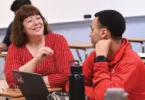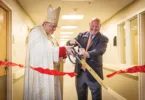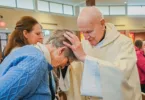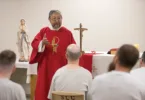‘We’re not interested in controversy or debate; we’re interested in helping patients’
by Kara Hansen
Special to The Leaven
SHAWNEE — As the national debate over embryonic stem-cell research rages, patients around the country are quietly being treated and healed with the help of adult stem cells.
In the Kansas City area alone, over 1,500 patients have received treatments utilizing adult stem cells — at St. Luke’s Hospital, Children’s Mercy Hospital and the University of Kansas Medical Center.
“We’re not interested in controversy or debate; we’re interested in helping patients,” said Dr. David Prentice, senior fellow for life sciences at the Family Research Council in Washington, D.C. “Right here in the center of the country, adult stem-cell treatments are taking place. It’s critically important people become aware these adult stem cell therapies are available now.”
Prentice was in Shawnee on Nov. 14 to speak at the premiere of the Adult Stem Cells Saved My Life Education and Awareness Campaign. The Family Research Council, an organization whose mission is to promote marriage and family as well as the sanctity of human life in national policy, heads the campaign.
“What we’re trying to do through the campaign is to educate people and make them aware of adult stem cells,” said Prentice. “Because a lot of people don’t know about adult stem cells, many times people go without treatments that could help them or save their lives.”
Adult stem cells come from different sources in the human body. Depending on the type of illness one has, a patient can often be treated with stem cells taken from his or her own body tissue. Bone marrow and umbilical cord blood are also both sources of adult stem cells and have been successfully used to treat patients as well, said Prentice.
“Adult stem cells can come from your blood, brain, or even liposuctioned fat,” said Prentice.
Prentice said the science and research available support the use of adult stem cells in numerous treatments.
“They are improving health and saving lives right now, and people need to hear that,” said Prentice. “We used to hear that adult stem cells were very limited in what they could do, but now we know that’s old dogma in medical science. They are available and they do work.”
On hand at the event were several individuals from around the country who have been either cured or treated for serious diseases such as sickle cell anemia, systemic scleroderma, spinal cord injury, and congenital heart failure. Each person had received revolutionary treatment using adult stem cells when all other currently available treatments had fallen short.
“Not all treatments [using adult stem cells] are cures, but there is documented evidence it does improve lives,” said Prentice.
Still, a good deal of the country and medical profession have to play catchup with the current research and success of adult stem-cell treatments, said Prentice. Several of the patients spoke of the expense of their treatments or needing to travel outside the United States to obtain treatment in specific cases.
“I travel around the country speaking to groups and medical professionals, and over half the people and half the doctors I speak to are not aware of the advances in adult stem-cell research,” said Prentice.
As part of the campaign to help get the word out, Chuck Weber, executive director of SaintMax Worldwide, created several videos profiling families whose lives have been significantly impacted by adult stem-cell treatment. The videos are currently available with this story at the Web site: www.theleaven. com. They are permanently on the Adult Stem Cells Saved My Life Education and Awareness Campaign’s Web site.
For more information on the groundbreaking treatments being accomplished with adult stem cells, visit the Web site at: www.stemcellresearchfacts.org.






